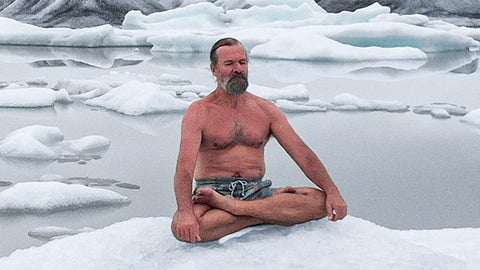You have no items in your shopping cart.
0item(s)
You have no items in your shopping cart.
You have no items in your shopping cart.
There’s no denying that using cold water in your wellbeing plan is a huge trend right now. From Wim Hof appearing in Freeze the Fear, to Joe Wicks installing an ice tub in his backyard, immersing yourself in icy water is everywhere.
Whilst we’re happy to admit the sound of it is terrifying, the scientifically proven benefits of doing so are huge. Mental, physical and emotional health can all be improved, but importantly, it’s also great for the environment.
If you’re feeling sluggish, unmotivated, or struggling to recover from sore muscles and fatigue, whilst it might sound intimidating, cold water could be a great option to feel better!
Well, it’s not new – that’s for sure. Dunking in cold water has been used for thousands of years. Nordic dwellers often get out of their hot springs and roll in the snow to dry off! Hippocrates, the great philosopher, shared his love of a frigid swim back in 370 BC.

It’s defined as any period in water under 15 degrees. Putting that into perspective the average cold-water temperature in London is 12 degrees.
There are those that take it to the extreme, submerging in ice, but benefits start well before that, so you don’t have to.
Cold water therapies are so effective, they’ve even been adopted by the NHS, with Chill UK in Devon offering cold water swimming courses to those with mental health issues. A 2014 study demonstrated that people suffering fever-like symptoms recovered faster with the Wim Hof method.
The idea is that our immune response and concentration spans have become sluggish through comfort. By reactivating our defence mechanisms, we kickstart our immune response and brain function.
If you’re not up for trying this, may we direct you to our decidedly more luxurious ‘spa at home’ guide. If you’re up for it, however, read on!
Cold water is reported to help you by:
Best of all, it tones and tightens the skin as well as improves blood flow and skin ‘glow’. Hot water can strip away the natural oils of your skin and dry it out, while cold water helps to constrict blood vessels to temporarily tighten pores and reduce redness.
Website Planet Save advocates cold showers (and reducing temperatures) as a key way to help conserve energy and save the planet.
Firstly, this is because even a few degrees lower temp can offer a great reduction in energy. Secondly, you’re less likely to spend so much time in it, saving precious water resources.
Now, government advice is four minutes. If you start at just 15 seconds of cold water and raise it to a minute, reducing your hot water time to three minutes, you can make a big difference.

Start with a warm shower and use an eco-friendly shampoo, conditioner and soap.
Make sure you’re fully rinsed, then the first time, turn your water down to around 18 – 20 degrees. Aim for 15 – 20 seconds.
The second time, head for about 15 degrees. If it’s really unpleasant, at first don’t submerge your head, but over time it gets more comfortable, and you’ll get more used to it.
Jump and out PAT don’t RUB yourself dry. Rubbing brings hot blood to the surface where it’s cold creating a feeling of increased coldness.






Get 10% off when you subscribe to Acala emails. Plus, be the first to know about our latest collections, events and tips from your favourite insiders!
| Product | Price | Quantity | Options | |||||
|---|---|---|---|---|---|---|---|---|
| Features |
| Availability: |
| Price |
| Options |
| Actions |

← Older Post Newer Post →